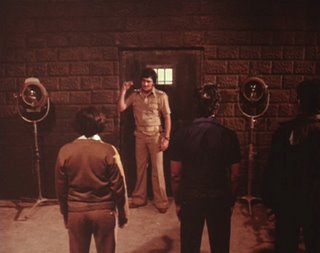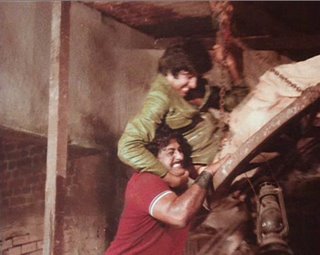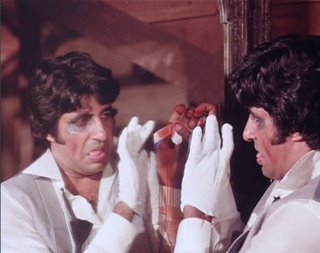I wonder if anyone has written a thesis on this? Amar Akbar Anthony
This movie is a hoot. It's got such a gleeful mix of everything I hardly knew what to expect next - except, of course, that the family would be reunited, since it was clear from the get-go that there was heavy moral order going on here. You don't dump your kids off at the feet of Gandhi on Indian Independence Day if you're going to be noncommittal about how things wind up.
Since there's no possible way that I have anything to say about this movie that hasn't already been said, I'll just say that it's really fun and everyone in it is great and then share a few of my favorite things:
Vinod Khanna is so cool he can snap on the interrogation lights.


This has got to be my favorite Amitabh fight scene ever.

And this might just be my favorite Amitabh scene of any kind ever because he's so very, very funny.

On second thought, wait. I do have something else to say - or, rather, ask. For reasons that are still not entirely clear, even after a solid 24 hours of thinking about them ("24 7 I think of you, 24 7 I think of you..."), there's an idea rattling around in my head that the people who made this movie had something serious, or at least important, to say, but I'm not sure what it is. There was something about the religious/cultural assignment of the three leads that didn't seem to be just for kicks - and I'm wondering if they're each supposed to represent some different facet of Indian culture, or the Indian experience, or maybe three distinct values. We have the oldest boy being Hindu, yet I don't think we ever see him do anything particularly religious (unless I missed it, which is entirely possible - he doesn't go to any temple, does he, or say a prayer, or make an offering...?). The Muslim and Christian sons, though, are more conspicuously religiously identified. (Speaking of which, what is that place Akbar is singing at when his mother comes upon him and, stumbling towards the statue, has her sight restored? Is it a mosque or a temple - or some kind of interdenominational communal house of worship? The statue seems to be treated like a Hindu deity of some kind, with garlands and coconuts, but didn't I see a star and crescent in that building too - plus, of course, Akbar singing? My dvd had no subtitles in songs, so I have no idea what he was actually singing.) (One aspect of the religious lens, or whatever you want to call it, that I found particularly interesting was the death of Anthony's "father" - who, celibate, has a "son" - who, for his flock's protection, gives his life. Kinda heavy-handed, but point taken.) Then we've got the whole nationalism thread, with the kids being left with Gandhi on 15 August and a blind but all-sacrificing, all-loving, all-welcoming mother named Bharati. This movie was made 30 years after independence; are the filmmakers saying that India was stumbling and blind and only through the identification and embracing of its constituent parts can it regain vision?
Anyway. My usual consultant on such matters is really busy right now, so I went on a research binge, as my librarian heart is wont to do. I haven't hit the academic databases yet - yet - but even I may not need to look any further, thanks to this great article on philip'sfil-ums. So think about the movie, then pop over to philip's and read what he has to say. Then get back to me, okay? I'm really curious about what everybody thinks.
Since there's no possible way that I have anything to say about this movie that hasn't already been said, I'll just say that it's really fun and everyone in it is great and then share a few of my favorite things:
Vinod Khanna is so cool he can snap on the interrogation lights.


This has got to be my favorite Amitabh fight scene ever.

And this might just be my favorite Amitabh scene of any kind ever because he's so very, very funny.

On second thought, wait. I do have something else to say - or, rather, ask. For reasons that are still not entirely clear, even after a solid 24 hours of thinking about them ("24 7 I think of you, 24 7 I think of you..."), there's an idea rattling around in my head that the people who made this movie had something serious, or at least important, to say, but I'm not sure what it is. There was something about the religious/cultural assignment of the three leads that didn't seem to be just for kicks - and I'm wondering if they're each supposed to represent some different facet of Indian culture, or the Indian experience, or maybe three distinct values. We have the oldest boy being Hindu, yet I don't think we ever see him do anything particularly religious (unless I missed it, which is entirely possible - he doesn't go to any temple, does he, or say a prayer, or make an offering...?). The Muslim and Christian sons, though, are more conspicuously religiously identified. (Speaking of which, what is that place Akbar is singing at when his mother comes upon him and, stumbling towards the statue, has her sight restored? Is it a mosque or a temple - or some kind of interdenominational communal house of worship? The statue seems to be treated like a Hindu deity of some kind, with garlands and coconuts, but didn't I see a star and crescent in that building too - plus, of course, Akbar singing? My dvd had no subtitles in songs, so I have no idea what he was actually singing.) (One aspect of the religious lens, or whatever you want to call it, that I found particularly interesting was the death of Anthony's "father" - who, celibate, has a "son" - who, for his flock's protection, gives his life. Kinda heavy-handed, but point taken.) Then we've got the whole nationalism thread, with the kids being left with Gandhi on 15 August and a blind but all-sacrificing, all-loving, all-welcoming mother named Bharati. This movie was made 30 years after independence; are the filmmakers saying that India was stumbling and blind and only through the identification and embracing of its constituent parts can it regain vision?
Anyway. My usual consultant on such matters is really busy right now, so I went on a research binge, as my librarian heart is wont to do. I haven't hit the academic databases yet - yet - but even I may not need to look any further, thanks to this great article on philip'sfil-ums. So think about the movie, then pop over to philip's and read what he has to say. Then get back to me, okay? I'm really curious about what everybody thinks.

Comments
In partial answer to your questions: The temple where the boys' mother regains her sight is a shrine to to the Sai Baba of Shirdi, who actually has followers among both Muslims and Hindus, so this is indeed a very ecumenical and symbolic place, as you correctly noted. By the way, I know that it's a Sai Baba shrine because of the song Akbar performs there, "Shirdiwale Sai Baba."
I also don't recall Amar doing anything specifically religious - really Anthony is the only one of the three who is religious in the sense we use the word (i.e. outwardly observant); Akbar is clearly a Muslim but he's most importantly a professional singer, an entertainer, a qawwal, which is part of why the Imam doesn't like him for his daughter at first. The song he sings in his first performance, "Pardah hai pardah," is not a religious song - it's a slightly bawdy qawwali in which he says "There is a pardah (a purdah, curtain), behind the pardah is a secret; if I don't uncover the secret, my name isn't Akbar." So he's talking about breaking through the symbol of female modesty - very risque (as far as the Imam and his daughter are concerned).
Finally, in the wonderful tripartite love song, "Humko tumse," each of the three boys draws on the symbols of his own religion when swearing his love: for example, Anthony says "God promise," in English; Amar says "Ram qasam," and Akbar says "khuda gawah."
Great movie! Totally fun and over the top, but with interesting stuff to think about too.
Coming back to AAA, it had all the masala that you can imagine in those days.. lost and found, hindu-muslim-issai, love-shmove, smugglers, action, comedy and some amazing performances. Amitabh was Amitabh, but even Vinod Khanna and Rishi Kapoor turned in star acts, not to speak of Pran and Jeevan..
A fantastic entertainer, undoubtedly.
Even though it doesn't have somersaults by a cast of tens on top of a steam engine, an awesome supporting cast of inspectors and villians or even a coin with two of the same sides, AAA, more than Sholay, is the movie that appeals to people across genders and age. Now, if we can digitally remove Satyen Kappu from that movie, it'd be perfect.